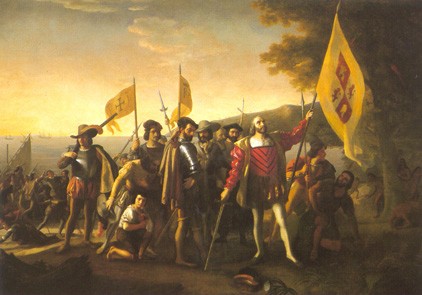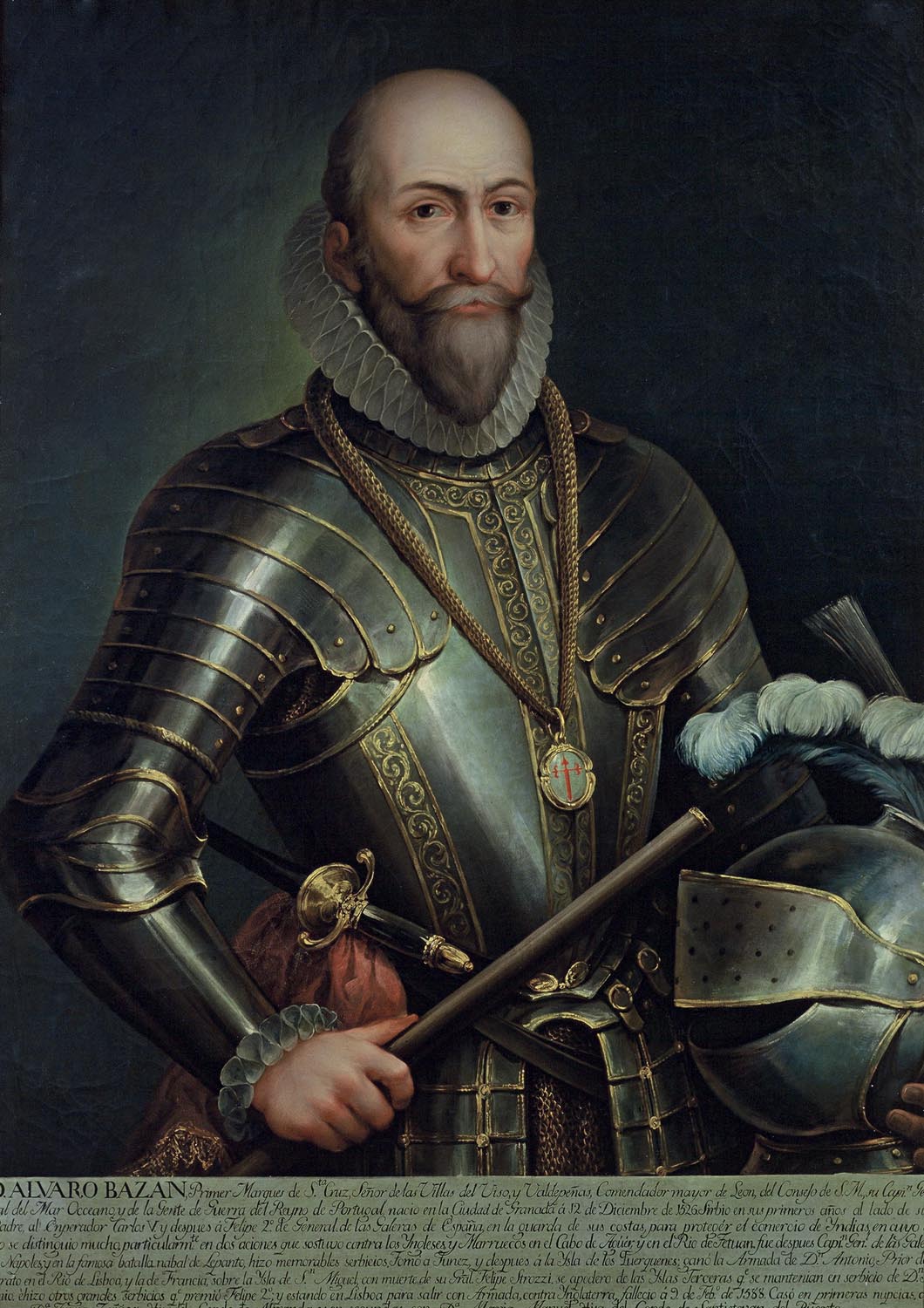 |
| Cruzadores of the Fe de la Sol |
A visitor to this strange country of ours must wonder how we came here. Is it true that we landed amongst these lush gardens and discovered ancient walled cities uninhabited but ready for the claiming? Si, this is so. Five hundred and fifty years ago we first arrived in this land, and in that time we have become a people to be well-reckoned with. The native inhabitants of the gardens call us now the Militaritos, the Children of War, for so mighty were we that they had never seen our like.
The historiadores tell of a fleet of ships that were commanded by a proud man, noble in bearing and countenance, and of a great storm off a foreign island that sent them scattered by the hands of fate. But rather than be dashed to splinters against the rocks, Capitán Medina (for such is the name of our hero, first king, and first regicide) demanded the old water-witch he kept always by his side save his people. He sacrificed many of them that day, but we were borne from danger to danger. Our ancestors sailed dark and perilous waters, but we they came at last to this place... to Paraíso.
 |
| Rey Medina-Sidonia, the first King of Paraíso |
Cascabel, the greatest of our cities. What ancients inhabited it we know not. It was first settled by King Modena in the earliest of times, and served as the heart of our kingdom when we fought the Crudo for possession of the Praderas Centrales. Flowering gardens, mighty waterfalls, and the walls of the forgotten folk define its borders. The Fe de la Sol and the Fe de la Sal both inhabit it in temples they have raised to their own grandeur.
This is the home of the Palacio de la Infanta, from which our proud Reyes rule.
 |
| Paraíso, the Isles of the Militaritos |
The Nobiles of Paraíso
The Rey and the Infanta
Our most beloved king, Alvaro Trastamara, is the fourth in this noble line. His father's father's father won the throne during the War of the Gardens. He is beloved of his people, who think on him as a doting father. Their love is ever more with him in these latter days, as the Reina Trystina was taken by the White Fever four years ago.
Their daughter, the little Infanta Isabel, is the beloved pride of the entire kingdom. Her every mood is known in the courtyards and marquets of the city by all and sundry. We hang upon her words and pray that her dark spells will not endanger her livelihood.
The Duques and Duquesas
The greatest lords of the kingdom, there are three Duques and two Duquesas. They rule the Central Provinces under the Rey and are arranged around Cascabel like a constellation. Each has their own schemes and plots, but all are loyal to the kingdom.
The Marqués and Marquésas
Beyond the boundaries of the Central Provinces are the hard lands. Marqués and Marquésas govern these territories, granted with vast military powers. The titles are not hereditary, but rather appointed.
The Condes and Condesas
The Condes and Condesas make up the majority of the upper nobility in the kingdom. They are the powers in the Rey's court, and they assist him in the governance of the land. It is from their ranks that potential Marqués and Marquésas are drawn, and them also who support the great edifices of the Cults.
The Barónes and Baronesas
The lesser nobility, the Barónes are charged with keeping their lands safe and the roads in repair, raising troops and keeping them outfitted with musket and sword, and generally ensuring the continuation of the kingdom and the enforcement of the tax structure.
Other Folk of this Land
The Crudo - This race of green-skinned folk inhabited the lands before us. They were here to see Los Antiguos vanish or be destroyed, and they have learned much from them. They are steeped in strange alchemical arts, and know how to make powerful weapons the likes of which we cannot match. Still, their disunity is our strength. The Crudo Principes are more concerned with fighting each other than fighting us. Their daemoniac skills are turned always to self-annihilation.
Crudo Magical Items
The Cazador. While our arma de fuego can spit hot lead, the arms of the Crudo are known for even greater might. The chief amongst their arsenal is a long musket known as the Cazador, which is often made from the tusks of an oliphant and hard horn-wood, all carved into fantastical shapes. The Cazador es let out a great bellow shriek when they are fired and a pale blue ghost-smoke drifts up into the air. The shot penetrates all armor, and those struck by it often die within the hour from a horrible wasting disease transmitted by the ball. No balls have ever been recovered from these dread weapons, so the eruditos believe that they dissolve in flight.
The Perferadora. These are Crudo cannon that have been fashioned from the horns of deceased demons. They are used against city walls, primarily, though I have seen them loaded with crudo alquitran (that is, pitch or tar) which is fired in massive globs to mow down tens of soldiers at a glance and injure hundreds more. However, the primary shot fired by these beastial weapons is an iron ball filled with small innocuous looking filings. When exposed to air, however, they glitter and burn like lightning and may crack stone with ease.
While Crudo are not recommended to be used as a player race, it is possible that they may be slaves or serve the men of Paraísa. If that is the case, the following modifications can be used:
+1 str, +1 con, +1 int, -2 wis, -1 cha
Their stats may be higher than 18. They may be fighters, thieves, Cura Del Sol, other types of priests, and they may even be wizards.
The Ogro - A beastial race indeed, the ogro have served as the work-horses of Paraíso for centuries. They are fit only to be slaves, their limbs thick and slow and their minds incapable of holding much in them.
Ogro are certainly not good for players, but if you decide to allow a player to begin as an ogro slave, use the stats from the Complete Humanoid for ogres.
The Bribon - Also called the dog-folk. The bribon inhabit forests and unexplored dells, and may even swarm over ruins left behind by Los Antiguos. They communicate in a barking howling language, and have been known to overwhelm border posts and caravans. Crudo despise them and kill them on sight.
Kits
These define your place in Paraísone society as well as your background. The rules from A Mighty Fortress should be kept in mind.Warriors
Ricohombre
The Ricohombres are men and women who beat the boundaries. They push back the edges of Paraíso and settle the wilds. They are known as brutal folk, capable of just about anything. They serve the almighty real and no faith or king. It's said that there are whole bands of Ricohombres in the wilds.
Requirements: Strength 9+, all races and both genders are eligible.
Role: Ricohombres are often hired by nobiles to deal with various blights on their property, or to establish colonies for them or otherwise extend their power. Ricohombres are not made for stand-up battle; they often wear light, maneuverable armor and do not drill extensively in the various skills which make soldiers suited for war. Rather they are often skirmishers, and they rely as much on their wit as their weapons.
They often ply the depths of ruins left by Los Antiguos; from lost cities to ruined castles and other less wholesome dens of darkness, Ricohombres will go wherever the pay takes them.
Weapon Proficiencies: Ricohombres may begin play with proficiency any personal weapon (but not large weapons such as cannon).
Nonweapon Proficiencies: Survival is a required proficiency for Richombres.
Equipment: While Richombres can use any kind of equipment, they prefer to stick to lighter armors.
Special Benefits: When dressed in an armor lighter than mail, the Ricohombre may subtract 1 point from all initiative checks.
Special Hinderances: Ricohombres are notorious for their unrefined behavior and suffer a -2 reaction penalty in any settled land. This may be negated or even reversed if the NPC in question has a reason to like Ricohombres.
Esclavadore
There are slaves in Paraíso, mostly those conquered by war or debt. Crudo are often slaves of this sort. Esclavadore must begin the game under the ownership of someone else, but they may be manumitted at any time.
Requirements: Strength 9+, Con 10+
Role: Esclavadores are fighting-slaves who do battle for Crudo Principes or for the señors of Paraíso. They excel at battle, but are skilled with little else.
Weapon Proficiencies: Esclavadores may learn the cannon group for 2 WP slots but they are not permitted to learn any other ranged weapon lest they turn upon their masters.
Equipment: Esclavadores may begin play with any weapon they know (save cannon) and a single suit of leather armor. They also have 1d6 reals in spending money and an outfit furnished for them by their master.
Special Benefits: Esclavadores gain +1 con and +1 strength from their soldiery training.
Special Hinderances: Besides being slaves, Esclavadors receive only half the standard NWPs.
Caballero
The Caballero are descendants of nobiles or nobiles themselves in full flower. Use the Gentleman Adventurer kit from A Mighty Fortress.
Thieves
Use the thief kits from A Mighty Fortress.
Priests
Cura del Sol
The Cura of the Sun worship one of the Five Hundred Forms of the Sun-God Mithrago. They are statistically normal clerics. Other types of clerics exist, I just do not have time or the room to catalogue them here.
Wizards
Erudito
Erudito use the scholarly wizard from A Mighty Fortress

No comments:
Post a Comment